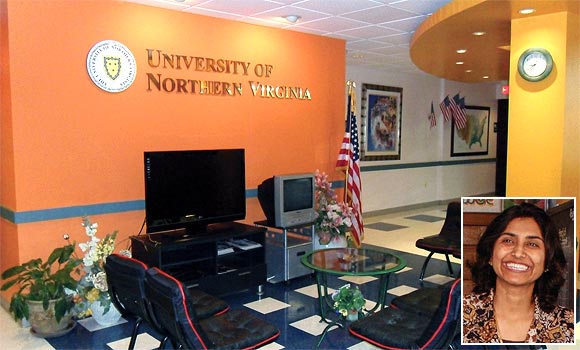Aziz Haniffa
Nearly 70 Indian students in the US continue to remain in limbo after Immigration and Customs Enforcement officials raided the University of Northern Virginia and the Customs and Immigration Service subsequently rejected their transfer applications. Their attorney and counsel Sheela Murthy says that she has now advised them to file a class-action suit against the university.
Such a suit would have merit, Murthy told India Abroad, because the Office of International Student Affairs and the UNVA's Department Student Officer did not provide the students with information that would have enabled them to make the correct application. Had they responded immediately when the USCIS found some applications incomplete, the outcome may have been different.
With the deadline looming and the students fearful of deportation, she said, discussions were continuing "to come up with possible solutions that will help them respond and file a motion to reconsider their cases."
Senior USCIS officials continued to contend that the process of dealing with the plight of several hundred Indian students (with regards to their applications to transfer to other universities and others under consideration for Optional Practical Training and Curricular Practical Training) was being conducted on a case-by-case basis.
Bona-fide students, the USCIS maintained, were not being victimised.
The officials pointed out that the applications of several students had already been processed and approved; many of them had transferred to other schools and had their OPTs and CPTs okayed.
Murthy said putting the onus on the students, whose applications were rejected by the USCIS on the grounds that they should have known what information to provide in their applications was "ridiculous". She further stressed that it was the job of the UNVA's DSO to advise them.
"Who's supposed to tell them (the students) what to do? How can the government say that it's their (the students') job and they are supposed to read all the rules and laws and know all about it, when they have put their trust in the DSO?," she asks. "You are not an expert on all of the nuances of the rules and regulations here, and you expect the DSO to provide you with the best advice and counsel and help in completing these requirements. They (the students) relied on the DSO and the DSO misled them. ICE, the government is also at fault here...These kids have paid $20,000-22,000 for two years of masters -- $44,000 on average just for tuition, and what about living expenses?"
Murthy acknowledged that she had told the students to ensure they have a backup plan.
"Even if you do appeal or fight," she explained, "you have to have a backup plan to leave the country and either get an H-1B sponsorship through a new H-1B employer (if they've finished graduating) or go (back to India) and come back with a fresh I-20 (certificate of eligibility, a pre-requisite for a student visa) and possibly try to use the same visa stamp. A few of their friends have done that and it's worked."
A backup plan is imperative, she said, because if the students overstay their visa, "there is a possible three-year or 10-year ban that could apply against these kids."
The DSO should have guided the students, she reiterated. "And the DSO failed to notify them and we believe the DSO is the agent of the ICE acting on the school premises," she said.
A UNVA official who did not want to be identified told India Abroad: "We fired the old DSO and we have hired new people."
Murthy said that was no excuse. "If I hire an incompetent person that ruins your life, I am still liable even if I fire that person," she said.
In July 2011, Department of Homeland Security -- the parent body of the USCIS and ICE -- officials raided the UNVA, situated in a strip mall in Annandale, Virginia, a suburb of Washington, DC. Over 90 percent of the UNVA's students are from India, mainly from Andhra Pradesh. At the time, Homeland Security officials told India Abroad that if in a month's time the UNVA could not provide a satisfactory explanation as to why it issued some 2,500 I-20s when only 50 were approved, it would be shut down like the Tri Valley University in California.
USCIS and senior Indian embassy officials in Washington, DC, who have been working with the DHS, told India Abroad that the UNVA had not been shut because of intervention by the embassy -- they argued that the students would be left in limbo after spending considerable amounts of money and time.
The sources also said that unlike in the TVU case, where some of the actions taken against the students were perceived as arbitrary, the transfer applications and OPT considerations for UNVA students were being reviewed on a case by case basis. This is thanks to the Indian embassy's discussions and negotiations with DHS officials. "The genuine students have not been victimised at all and have had their transfer applications and OPTs approved," a source said.
One diplomatic source added, "Once we intervened with the US authorities -- and they were also mindful of what happened at TVU -- the UNVA was able to continue. But they (the DHS) are looking at the various OPTs, CPTs, how many were genuine students and how many of them were gaming the system (working full-time when their student visa did not authorise them to do so) and violating their OPT and CPT requirements. We remain in touch with them to ensure that genuine students are not being victimised in any way."
Though DHS officials declined to comment on the investigation into the UNVA, other sources acknowledged that unlike TVU, which was considered an utterly sham university, the fact that the UNVA has not been shut down means that its violations of the regulations were not as blatant.


Comment
article